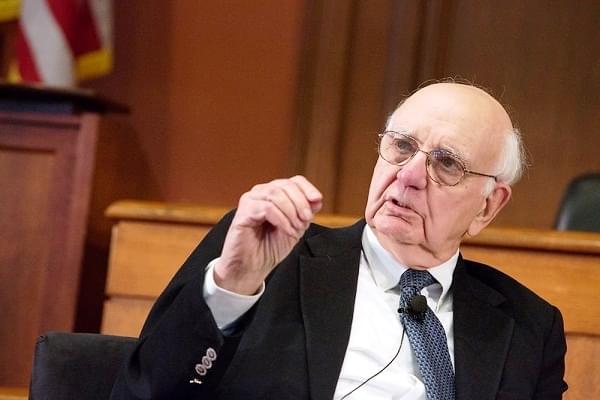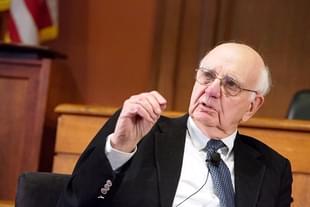News Brief
Remembering Celebrated US Fed Chief Paul Volcker: How His Report Helped Expose Corrupt Deals Of India’s Congress Party
Swarajya Staff
Dec 10, 2019, 03:12 PM | Updated 03:12 PM IST
Save & read from anywhere!
Bookmark stories for easy access on any device or the Swarajya app.


Paul Volcker, who during his stint as Federal Reserve board chairman in the 1980’s is widely credited with slaying the high inflation that plagued the American economy for long, died yesterday (9 December) at the age of 92.
Volcker is feted by monetary economists across the world for establishing the primacy of an independent central bank.
During his stint as the Fed chairmen, Volcker’s tight monetary policies pushed the interest rates as high as 20 per cent but he successfully managed to tame Inflation that ravaged the US economy in the 1970s.
Volcker served in both Democratic and Republican administrations for almost three decades playing a pivotal role in formulation of monetary policy and supervising the nation’s financial system.
After the global financial crisis, Volcker advocated breaking up large banks and banning commercial banks from higher-risk activities, such as proprietary trading.
Under the “Volcker rules” he put together, a series of federal regulation were passed that prohibited banks from conducting certain type of investment activities with their own accounts and limits their dealings with hedge funds and private equity funds.
After his retirement from the helm of affairs in US economic policy making, Volcker headed a committee investigating dormant accounts and other assets in Swiss banks that belonged to Holocaust victims. He was also appointed to chair the International Accounting Standards Committee developing global accounting practices.
In 2004, United Nations Secretary General Kofi Annan appointed Volcker to head an independent panel investigating corruption allegations in the UN’s Iraqi Oil-for-Food programme.
The $60 billion programme, under which Iraqi oil would be sold in exchange for food under the supervision of the UN, was launched in 1996 to help the Iraqis suffering under international sanctions after the country’s then ruling dictator Saddam Hussein's invasion of Kuwait.
In Volcker's 2005 report, senior Congress leader and Gandhi family loyalist Natwar Singh (who was then India’s External Affairs Minister), Panthers Party head Bhim Singh and few corporate houses were named as "non-contractual beneficiaries".
It was alleged that with Natwar's help, his son Jagat and his friend Andaleeb Sehgal secured four million oil barrels from Iraq which they illegally sold to a Swiss company, Masefield AG.
In return for these illegal sales, Masefield is said to have paid kickbacks (termed "surcharges"), partly to Saddam Hussein's regime and partly to Natwar Singh and others.
The kickbacks were alleged to be Hussein's way of securing support from politicians around the world and that this bribe money influenced Natwar Singh to lobby against US policies in Iraq (in particular, US sanctions on Saddam Hussein).
Natwar and Congress party were known to be vociferous supporters of Baathist regime of Saddam Hussein.
Adding credibility to allegations, a Crotian diplomat Aniel Mathrani said that Natwar introduced his son and Sehgal to the Iraqi establishment during a January 2001 visit to Baghdad.
Natwar defended the allegations by saying that he was operating at the behest of Congress which was also mentioned in the Volcker report.
An investigation by Enforcement Directorate alleged that Natwar "jointly and severally" got foreign exchange totalling $898,027 (Rs 5.4 crore), in violation of FEMA.
A huge uproar ensued in the Indian parliament with opposition demanding investigation in to the murk dealings of Natwar. Facing the heat from the opposition, committed headed by Justice R S Pathak was appointed by the then ruling Congress -led UPA government to look into Volcker allegations. Natwar continued to remain defiant refusing to resign from the Union Cabinet.
In August 2005, the Justice Pathak committee released its judgement. Pathak's report, which was submitted to then prime minister Manmohan Singh, was never made public but is said to have agreed with the findings of Volcker report on the dubious role played by Natwar.
According to committee found that Andaleeb Sehgal, a friend of Jagat Singh, and Aditya Khanna, a relative of Natwar Singh, received financial payoffs by procuring oil coupons based on recommendations given by Natwar Singh.
On expected lines, the committee however claimed that there was no evidence linking the Congress party with these dealings. Based on this report, Jagat Singh was expelled from the primary membership of the Congress party. Natwar Singh was dismissed from the Cabinet and his party membership was suspended.





